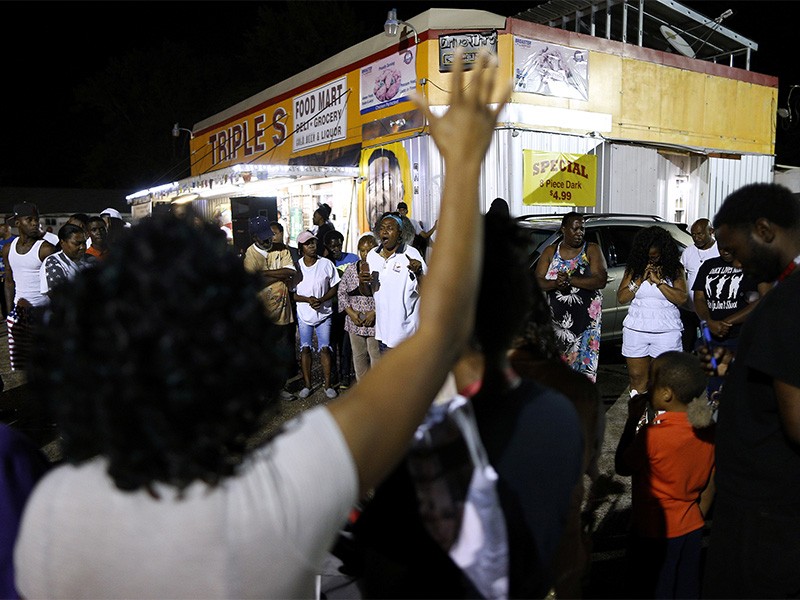Is racism reasonable? Americans seem to think so.
Apparently people think it's okay to treat black people the way Alton Sterling was treated.

c. 2017 Religion News Service
(RNS) I was sitting in a restaurant when I learned that the police officers who killed Alton Sterling would not be charged with a federal crime. The banner that came across my iPhone read, “Justice Department official criticizes officers tactics, but says officer did not act unreasonably.”
At that moment, I knew that my news app was saying something very true about our country: We don’t believe it is unreasonable to treat black people the way Alton Sterling was treated.
That was true in 1619 and it is true today.
In America we do not see racism as unreasonable. However, if progress is to be made, we must acknowledge that racism balks at the very concept of reason.
There has been much conversation in Louisiana — the state where Sterling was killed — about the removal of Confederate monuments. Those who want us to “preserve history” find it reasonable to maintain structures that pay homage to an institution that went to war over the right to desecrate the black body. It is reasonable to citizens there that the figures of the Confederacy be held in high esteem.
We are supposed to look to history to see how far we have come. The irony here is that holding on to this piece of history really proves we have not moved that far at all.
From 1619 until the slave trade was abolished, people did not think it was unreasonable to capture humans from the coasts of West Africa, shackle their hands and feet as they walked hundreds of miles to the Atlantic shores, and then stack them like sardines in the belly of slave ships for months at time.
They did not think it was unreasonable to build an economic system and almost split the sacred union in half over the continuation of the slave society.
In the 19th century, people did not think it was unreasonable to lynch and burn at the stake, to destroy and pulverize black bodies for the sake of maintaining domination.
They did not think it was unreasonable to bash Emmett Till’s head and leave his brutalized and maimed body in the bottom of the Tallahatchie River.
In the dark times of Jim Crow, people did not think it was unreasonable to create laws that relegated where different races could sit, eat, drink and swim. We did not think it unreasonable to have signs that read “Whites Only” and “No Niggers Allowed.”
In the 1960s, they did not think it was unreasonable to bomb churches and pin German shepherds on schoolchildren protesting for their parents’ right to vote.
We did not think it was unreasonable for our leaders, Martin Luther King Jr. and Malcom X, John Kennedy and Medgar Evers, to become martyrs simply for the cause of human equality and black dignity.
We did not think it unreasonable to endow the police with the power to brutalize Rodney King, to riddle Amadou Diallo with 41 bullets and ignore Eric Garner’s last plea for a human breath.
In 2017, Americans still cannot fathom that the black body is not something to be controlled or handled by the state, but deserves liberation, opportunities and resources offered to others.
It seems to me that in our country we have a history of making the unreasonable feel reasonable and the reasonable feel unreasonable. Nothing shows this more than our failure to secure racial justice once and for all. But this misunderstanding is not permanent. With every new day, there is a new opportunity for us to see what is reasonable and what unreasonable.
On July 5, 2016, Sterling had an altercation with Baton Rouge police because despite everything his country told him, he could see that he was not the unreasonable one in that scenario. Officer Howie Lake and Officer Blane Salamoni were.
Sterling was not unreasonable for standing at that corner selling CDs. He was not unreasonable for interrogating the police as to why they were bothering him. And he was not unreasonable for resisting an all too soon death.
Lake and Salamoni were unreasonable for taking his life.
And we are unreasonable because we let it happen to him then, and we keep letting it happen every day in America.
But, I thank God for the reasonable witness of Sterling and every other person who protests the unjust brutality of the black body by the state.
Their reasonable protests cry out for us to join them and end the unreasonable tradition of our society. Today I am choosing to be reasonable. Will you?




